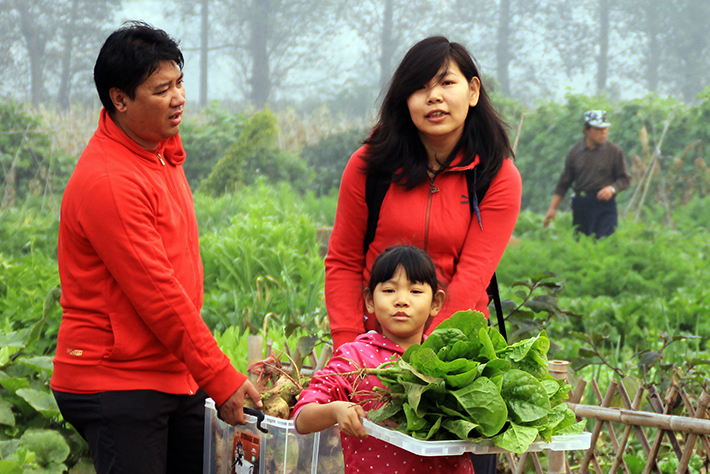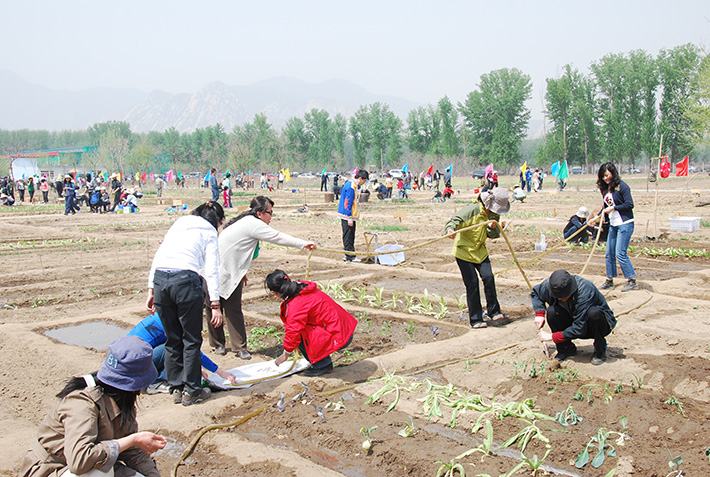|
||||||||||
| Home Nation World Business Opinion Lifestyle ChinAfrica Multimedia Columnists Documents Special Reports |
|
||||||||||
| Home Nation World Business Opinion Lifestyle ChinAfrica Multimedia Columnists Documents Special Reports |
| ChinAfrica |
| It's Only Natural |
| A popular agricultural model provides urban dwellers with organic vegetables while promoting rural development |
| By Li Jing | VOL.10 November ·2018-11-08 |

Urban dwellers grow and harvest their own vegetables (COURTESY PHOTO)
On Little Donkey Farm, located in northwest Beijing, children from Qingdehui Nursery, accompanied by their teacher and parents, are learning how to grow and pick vegetables and fruits. "We hope that children can understand how food is grown and learn to appreciate it while having fun," teacher Liu Qianqian told ChinAfrica.
According to Liu, all vegetables here are grown organically by making the farming process eco-friendly. In fact, most of the vegetables used in her nursery come from this very farm, providing children with healthy food daily, she said.
In recent years, many similar small-scale farms have sprung up around the Chinese capital. They offer various services such as garden plot rentals and vegetable delivery subscriptions, as well as a place of recreation and leisure for city residents. Several of them, just like Little Donkey Farm, subscribe to a series of principles that are summarized under the label CSA (community-supported agriculture).
Sharing benefits
The CSA concept, which emerged in Switzerland in the 1970s, has spread gradually throughout the world. With the goal of sharing both benefits and risks, CSA aims to build friendly and direct relationships between farmers and consumers by cutting out middlemen. In 2008, Little Donkey Farm adopted the CSA model and became one of its most fervent advocates in China.
"We hope to turn Little Donkey Farm into a miniature Chinese village. This way, visitors who come here will be able to experience the culture and lifestyle of a Chinese village," the farm's General Manager Huang Zhiyou told ChinAfrica.
With their standards of living improving, Chinese citizens are paying more and more attention to food safety. As a result, the demand for organic foods has increased over the last few years. Because it meets the needs of modern city life, experts believe that the CSA model is a perfect fit for Chinese consumers.
"CSA focuses on organic farming, which uses organic fertilizers instead of pesticides, chemical fertilizers and herbicides. By using smart and biological methods, we respect nature's diversity," said Huang.
For example, at Little Donkey Farm, city dwellers can rent a garden plot of 30 square meters for an annual fee of 2,000 yuan ($290). With the help of agricultural experts, visitors can take part in sowing and fertilizing, and then reap the fruits of their hard labor. Those who do not have enough time to grow their garden can pay an additional 1,600 yuan ($232) a year to hire professionals to sow and harvest for them. The vegetables, once harvested, will be delivered directly to their doorstep.
"In the past, consumers didn't know where their food came from. CSA provides an effective link between urban and rural areas so that city dwellers can eat vegetables without worrying about their origin," said Huang.
The CSA approach also provides new leisure options for urbanites caught up in the capital's fast-paced lifestyle. They can release stress by spending their free time growing and harvesting fruits and vegetables with their families, thus rediscovering the joy of a slower rural life.
"Today, I picked radishes, cucumbers and peppers, and I would like to come back," said Kuankuan, a four-year-old boy from Qingdehui Nursery. After his hard work, he was also able to enjoy dishes cooked solely with vegetables grown on the farm.
And he is not the only one: According to Huang, Little Donkey Farm has provided more than 1 million kg of organic vegetables to over 2,000 households in Beijing over the last 10 years.

City dwellers tending to vegetables at Little Donkey Farm (COURTESY PHOTO)
Mitigating risks
Whether faced by natural disasters, pests or diseases, farmers are plagued by a number of challenges. For them, the CSA approach model is also a way of reducing and alleviating such risks.
"As CSA provides for advance payment, farmers can start producing without having to apply for a bank loan. This is a financial guarantee for farmers," said Huang.
CSA can also provide a solution to the phenomenon of "brain drain," which remains a serious issue in China's agricultural sector. With the country's rapid economic development, rural youth are increasingly reluctant to engage in low-income agricultural work, rather seeking opportunities in the big cities.
Huang said CSA can help encourage young people to return to the countryside, thus promoting the revitalization of the agricultural industry.
He believes there is a need to inspire the younger generation of potential farmers by giving them guaranteed livelihoods and dignity, in order to achieve sustainable development of labor resources.
A new approach
Although more and more acknowledged around the world and in China, the CSA method still faces many challenges.
First, the prepayment model means that consumers must establish a stable and long-term trust relationship with farmers. Gaining the confidence of city dwellers is therefore a major challenge.
Second, as the use of chemical fertilizers and pesticides is not permitted, CSA has to adhere to the natural laws in growing vegetables. In fact, CSA farms can only grow seasonal vegetables, which reduces the range of their production. In addition, the ban on chemical fertilizers also means lower yields.
Going forward, the CSA will need strong political support as an emerging model of agricultural development.
"In addition to public participation, CSA needs more government support. Urban and rural planning needs to take into account agriculture, and encourage the development of CSA farms around cities to ensure sustainable development of agriculture," said Huang.
Despite these challenges, the future looks bright for Little Donkey Farm. To date the farm has organized seven CSA-themed national conferences since 2009, welcoming over 5,000 representatives from more than 30 countries. Moreover, Little Donkey Farm has successfully incubated more than 500 CSA farms, leading to the creation of China's CSA Alliance in 2017.
(Comments to lijing@chinafrica.cn)
|
||
| About Us | Contact Us | Advertise with Us | Subscribe |
| Copyright Beijing Review All rights reserved 京ICP备08005356号-5 京公网安备110102005860号 |